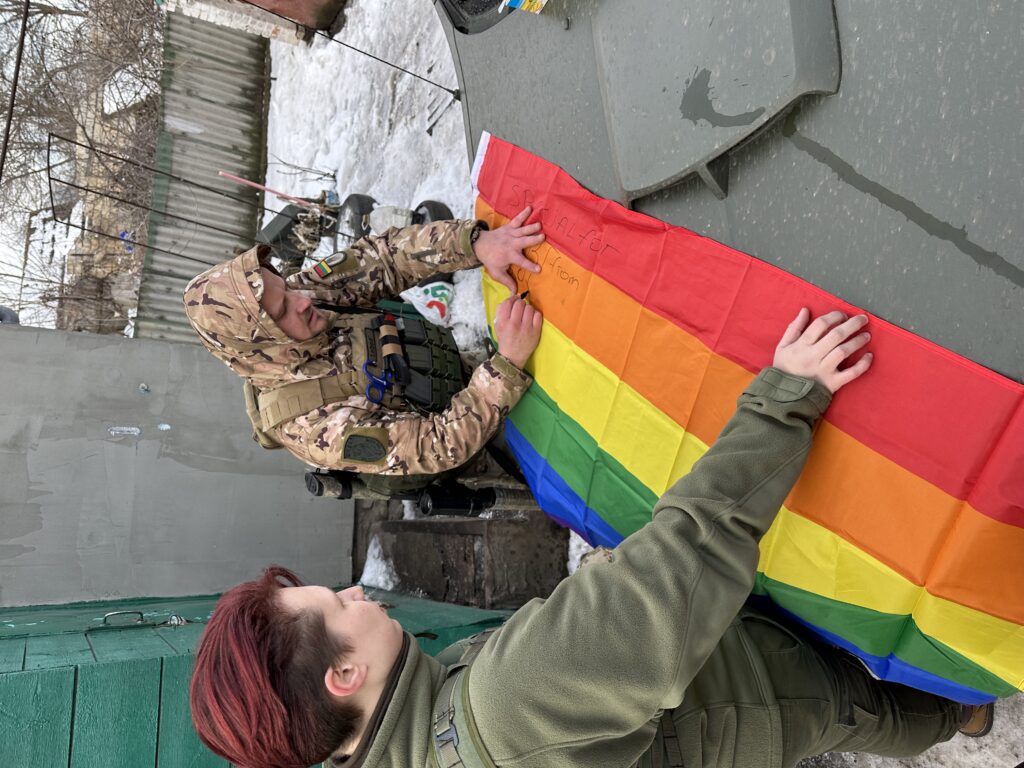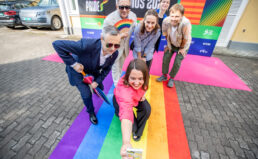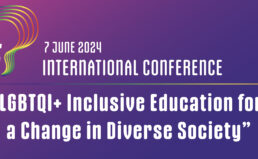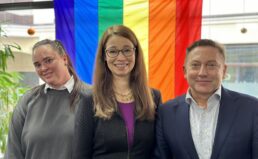Violeta, a volunteer of LGL’s emotional support platform for LGBT students, their parents and teachers who face bullying due to their sexual orientation, gender identity and gender expression, not only helps LGBT youth experiencing difficulties, but also actively participated in raising support for Ukraine. Violeta talks about volunteering on the emotional support platform of the National LGBT rights organization LGL and the support provided to Ukrainians who are going through the horrors of war.
You have been volunteering at the LGL’s emotional support platform for the third year already. What motivated you to provide support for LGBT students experiencing bullying and difficulties?
It was motivated by the fact that I myself am part of the LGBT+ community. I understand the difficulties and challenges young people face every day, how difficult and painful it is to go through it, especially if you have no one to talk to about it. I often get questions – why is it necessary to single out LGBT+ young people? Don’t other children, teenagers get bullied? I’d like to say they don’t, but bullying doesn’t escape almost anyone. The LGBT+ community is not unique in this regard, young people not only experience the same kind of bullying as others, but additionally receive rude, humiliating words and actions because of their non-traditional sexual orientation. No person should have to survive bullying, should not live in fear, loneliness. On the contrary, everyone must be guaranteed opportunities to create a safe environment to be themselves and enjoy life.
What are the most common requests? What problems and challenges do LGBT youth face?
Most of the time, they ask for advice, ways to tell their parents about their non-traditional sexual orientation. Many young people live with the fear that they will not be accepted, understood, rejected by their closest environment – their parents. Unfortunately, this fear is justified, because in Lithuania, homophobia and transphobia are still quite deeply rooted and are not only taboo, but also seen from an extremely negative, stereotyped side. Young people often hear homophobic remarks from their parents and other important people, so they decide that their parents will be hostile towards them too, maybe even kick them out of the house. Young people are afraid of their parents because they do not create a fully safe environment to be themselves at home.
Another big problem is school. A small number of young people feel physically and emotionally safe in the school space. They often write to us that they don’t trust teachers, social pedagogues, psychologists, they don’t feel safe to come and talk about the bullying they experience because of their sexual orientation, about the difficulties they go through in order to accept their sexual orientation, etc. There are cases where they experience rejection, bullying from school professionals when they ask them for help with the bullying they are experiencing. One often gets the impression that professionals are not prepared for specific situations or are unable to distance themselves from their personal opinions and simply respond to the need for help as a specialist.

How is LGL’s emotional support platform different from other support lines?
It differs in a very important aspect – every time you write, you communicate with the same volunteer(s). This means that the person seeking help does not have to retell their story each time they write, maintaining continuity and going deeper into the problem at hand. Also, communication on the platform takes place in a convenient way – not by letters, but by a principle similar to that of the “Messenger” app. The entire communication history is very conveniently visible and, if necessary, it is easy to return to a specific part of the correspondence.
In LGL’s emotional support platform, support is also provided to parents and teachers of LGBT youth. What challenges do adults apply for?
Adults usually come to us asking for advice on how to communicate with young people from the LGBT+ community. Often, adults (especially specialists) feel that they do not have enough information and competence in this area, they do not know what and how to tell young people so that they feel safe, understood, accepted. Questions are often asked about how to show young people that they accept them as they are, support and are ready to help them, create a safe environment to be themselves.
The questions that parents often have are similar to those of specialists – how to properly communicate with LGBT+ young people? What are some ways to show that you accept them for who they are? There are also questions about how to accept the fact that their child has a non-traditional sexual orientation, how to protect a child who is bullied and discriminated against. Also, parents themselves experience discrimination and are looking for ways to help them survive it. The questions and challenges are very diverse.

What does volunteering at the LGL emotional support platform mean to you? Did you learn something new about yourself while volunteering? Have you found a community among volunteers?
Volunteering on the LGL platform gives me the opportunity and space to give young people and their environment something that I did not have myself. I am sure that by giving my time, attention and experience, I help someone else to live another day and believe that life can be beautiful and worth living. Maybe these words are extremely loud, but a large part of the members of the LGBT+ community have thought about suicide at least once, and I am no exception. Therefore, the creation of this platform, its activity and the sincere attention of volunteers are extremely important.
By volunteering on this platform, I grow as a person, I become even stronger as I withstand the arrows of discrimination, which are not only aimed at me directly, but also at my community. I am glad that among the volunteers I found friends who are not only there in difficult moments, but also in joy, game nights, and conversations. Such a safe environment is necessary not only for those we help, but also for ourselves. Sometimes I cringe just thinking that I am blessed with wonderful people.

You are an active member of the LGBT community, you share insights on social networks. Why is helping others so important to you? Where do you get your energy from?
Helping another person create a safe environment for themselves is both a gift and a privilege. I didn’t have that kind of help myself, growing up I didn’t even know where to turn, there was no internet, so I was alone with myself and my challenges. I have accumulated a lot of experience in myself, from discrimination in the work environment to acceptance where I least expected it. I feel that I can and should share my story, because I believe that it can inspire others, give strength and security in my path, openness to myself and others, faith that life is worth experiencing. I myself observed and admired other open persons of the LGBT+ community, I nurtured the belief in myself that one day I too would become so strong that I would be able to provide comfort to others. Man is not created to go through life alone, we are all connected, our paths are intertwined, so it is necessary to find ways to stop that purposeful infliction of pain and accept everyone as he/she/they is.
I draw energy from nature, creativity and other people who bravely and openly share their stories. Experiences that reach a person directly from another person especially inspire me. In nature, everything has a balance, there everything happens as it should happen and there is enough space for everyone. Being surrounded by forest, lake, river, grass, sky, I recover, fill up with energy, balance. At the same time, my creativity breaks out in the form of writing, drawing, photographs. Everything comes together very beautifully, rhythmically, a feeling of fullness fills you.

After Russia attacked Ukraine, you got involved in gathering support, bringing support to Ukrainians who are going through the horrors of war. Tell us what you learned from this experience.
From the very first day of the war, I knew that I would go to Ukraine to help, there was and is no doubt or fear of going there. During my stay in Ukraine, I experienced many things, from living among ordinary civilians, hiding in a basement during a weather emergency, to spending the night right next to the front line, walking around destroyed houses, bridges.
Living without electricity, light, heat, water has taught me to appreciate more those basic things that are easily available at home. It is a unique experience to communicate with officers and their relatives, to listen to stories about life at the front. How much light, desire to enjoy life and peace these people radiate. These stories cut deep into the heart, grieve and at the same time calm, inspire, give the realization that the desire for freedom will not be defeated by cruelty. During one of the trips, I had the opportunity to participate in a motorcade dedicated to honoring those who died and are currently fighting. During it, people on the road waved at us, stopped their cars in order to give us the opportunity to drive unhindered towards our destination – the cemetery. The closer we got to the cemetery, the more often we saw people kneeling along the road. In this way, they expressed their respect for those who died and defended the freedom of their country. It was impossible to hold back the tears from the achingly majestic sight, the sense of awe at being part of such a special event.
During one of the humanitarian support missions, on the initiative of Karolis Sankauskas, we transported a jeep that was decorated with LGBT+ and Freedom Party stickers. This jeep from the LGBT+ community and the Freedom Party was dedicated to soldiers fighting at the front. It was indescribably good to drive from Vilnius to the front in Ukraine, because, except for one unpleasant note in Kiev, we did not receive any negative reaction from either civilians or soldiers. This time I also had a rainbow flag with the goal of getting signatures from the soldiers we were going to give the jeep to. I was completely calm, no fear of appearing at the front with LGBT+ paraphernalia and not in vain, because the signature fell on the flag as easily as on any other national flag. These wonderful people are fighting for the freedom of all people to live, without excluding anyone. I am proud to be a part of this fight.
The organization and transportation of humanitarian aid to Ukraine does not allow us to forget that a person can and should be a value to a person.

What message would you like to convey to struggling LGBT youth?
There are many things that I want to convey to young people, so I often share my thoughts in the public space and in conversations. As we live in these challenging times and strive to be accepted, the least we can do is start with ourselves. Accepting yourself and others regardless of past, present, profession, spiritual views, gender, age, nationality, favorite color, car you drive, body language… can be continued without end, because each of us is uniquely beautiful and different. Do not deprive yourself of the opportunity to know yourself and those around you. Remember that you make your own choices and you don’t need other people’s permission to love and be yourself.
Be proud of who you are because there may not be another option.
The emotional support platform of the National LGBT rights organization LGL for students, their parents and teachers facing bullying due to sexual orientation, gender identity and gender expression can be accessed at: https://lithuania.livewithoutbullying.com/
 The article was prepared for the project “Nothing about us without us: Empowering LGBT youth in the fight against bullying”. The project is part of the Active Citizens Fund, financed by the EEA Financial Mechanism.
The article was prepared for the project “Nothing about us without us: Empowering LGBT youth in the fight against bullying”. The project is part of the Active Citizens Fund, financed by the EEA Financial Mechanism.




